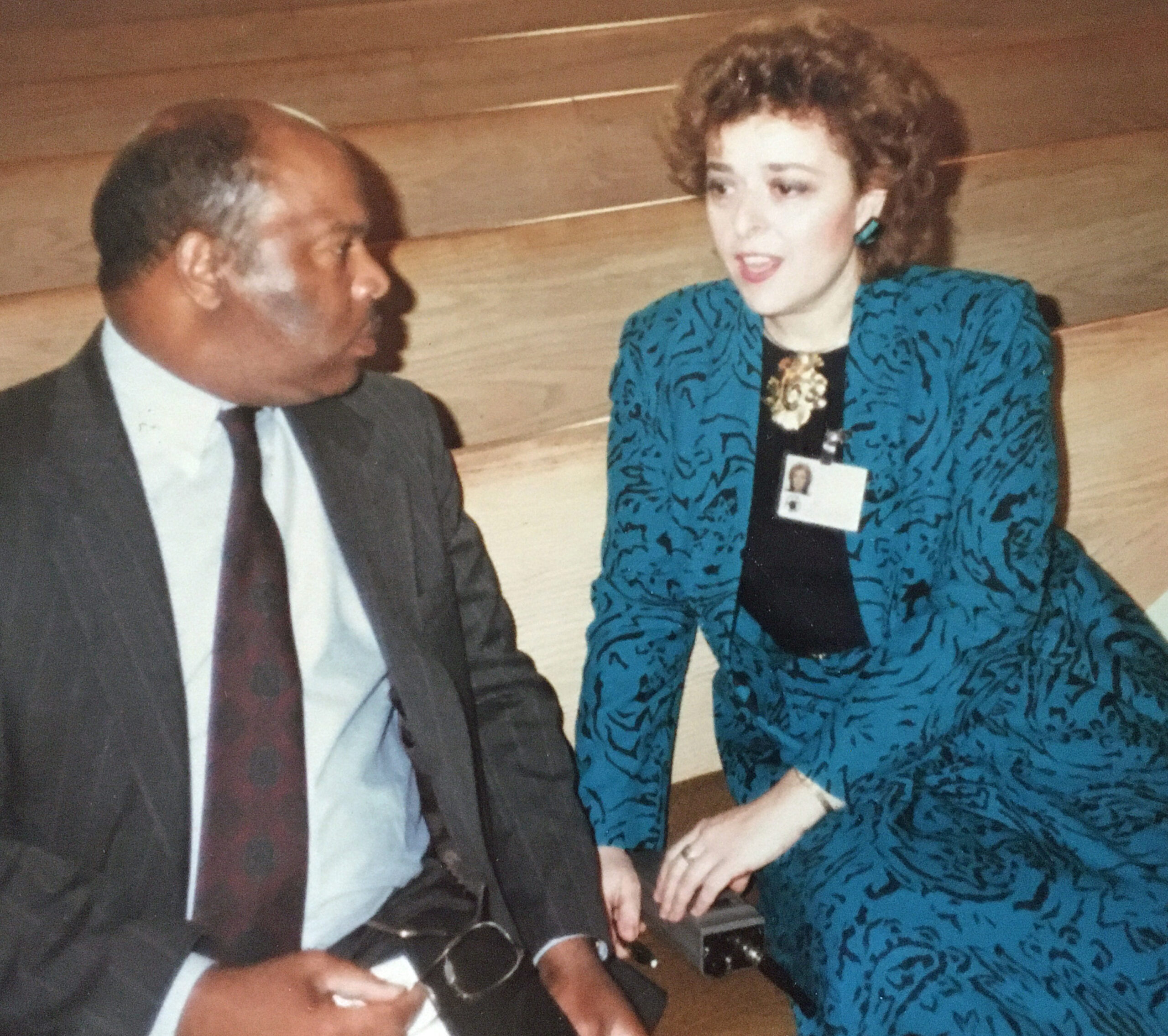
LILIANE KSHENSKY BAXTER, PH.D. (LILI BAXTER):
I remember first meeting John back in 1979. I had just started working at the King Center for Nonviolent Social Change in Atlanta, and he was with the Voter Education Project. I was called to a neighborhood-planning unit meeting and walking into the room saw somebody setting up the chairs — and it was John. So when people say he was humble, he really was humble. He did what needed to be done, and at that moment it was setting up chairs.
I ran the programs for college students who would intern at the King center and also a program called the Summer Institute on Nonviolence. John was a regular and a very generous speaker. I don’t think he ever, ever said no to an invitation, and if he was too busy or had other commitments he would find a time to talk to the students another time. It was not uncommon for John to invite students to his home for dinner, way beyond what he needed to do. But meeting with young activists energized him as much as it inspired the students. A win-win.
You could always count on John to be absolutely committed to the methods and tactics of nonviolence as taught by Gandhi and King. Everyone knows John for all the beatings he received during nonviolent protests. Those protest actions were tactical, designed to bring into the open the hidden covert violence that African Americans, especially in the South, lived with on a daily basis, so that it could be photographed for all to see. The march across the Edmund Pettus Bridge in Selma—Bloody Sunday—was documented by many, many cameras. ABC Network was forced to interrupt their movie showing of “Judgment at Nuremberg”—which was a landmark film at the time about the Holocaust—to show what had just happened in Selma. And that was a powerful, and dangerous, nonviolent direct action tactic. It was a principle of Dr. King’s that unearned suffering in a just cause is redemptive. When you do it tactically, it’s to educate and transform. And it did, it led to passage of the Voting Rights Act of 1965. John was an activist, so his focus was always on directed, focused social change.
John was not only committed to the methodology of nonviolence, but also to nonviolence as a way of life. John had this incredible, open heart for people. I remember we had lunch one day in the late 80s and although we had worked closely together and I had volunteered for his campaigns for Atlanta City Council and later for the US Congress, up until then he didn’t know that I was a child of Holocaust survivors and that I was born in a displaced persons camp. When I told him my family’s story he cried. It was the reaction of a compassionate person who understands pain, who understands injustice, and what people have gone through unjustly out of hatred and fear. I think he carried that, he carried the pain of his people, but also the pain of the poor, the disenfranchised, the marginalized. He believed it was his duty to speak for them, work for them.
I will tell you this. What occurred to me earlier was that, even though I loved him and was just thrilled for his being, his passing has led me to think about the many remarkable people, many of them associated with FOR, who I was blessed to know and who were also enormously courageous and visionary. These people are all my heroes equal to John. People like Lee Stern, Jim Lawson, Mike Robinson, Susan Glaser, Richard Deats, Doug Hostetter and his remarkable program with the Bosnian students, Murray Polner, Dorothy Cotton, Paul Pierce, Virginia Baron, David Hartsough, Lloyd Berg, Lynne Gottlieb, John Swomley, George Hauser, and on and on. I’m in awe of them all. What they did, are still doing, may not be as visible as what John did, but their work is as inspiring, as courageous, and all for the same cause.
I was very proud that John was my congressman. It was just wonderful for my husband and I to meet him in the supermarket parking lot. John would say “Hey, Lili and Tom, how are you doing? We’d talk a little, chat a little and catch up with our lives. He was an first-rate congressman.
John told me that he considered me a nonviolence trainer. “This is your work,” he said. That always made me feel great because that placed me with the elect, you know, I was with the best of the best.
[author] [author_image timthumb=’on’]https://forusa.org/wp-content/uploads/2020/07/Liliane-Baxter.jpg[/author_image] [author_info]A child of Holocaust survivors, Dr. Liliane Kshensky Baxter, PhD was born in a Displaced Persons camp in Sweden, and has devoted her life to social justice and human rights. She worked for over a decade as Director of Nonviolence Studies and Research at The Martin Luther King, Jr. Center for Nonviolent Social Change in Atlanta, Georgia, where she is presently Senior Educator in Nonviolence. For over 13 years, she directed the Weinberg Center for Holocaust Education at the Breman Jewish Heritage Museum in Atlanta. Committed to global peace and justice, Dr. Baxter served as National Chair of the Fellowship of Reconciliation (FOR) and represented the United States on the governing board of the International Fellowship of Reconciliation (IFOR) headquartered in the Netherlands. Dr. Baxter has taught and lectured widely, both within and outside the academy, on women’s issues and issues related to the Holocaust, and has led nonviolence workshops in the U.S. and abroad. She holds a Ph.D. from Emory University in Human Development and Women’s Studies. [/author_info] [/author]







